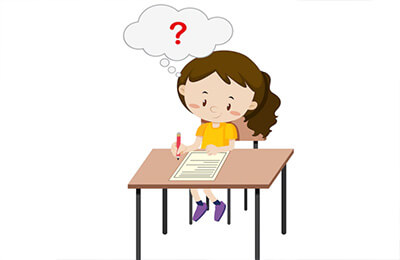反意疑问句的几个要点
时间:2022-09-11 03:35:25

人们对某事或某物不十分肯定而希望得到进一步证实时,或者想征询旁人对自己的看法或意见时,总爱使用反意疑问句。因此,这种疑问句在口语中是很常见的。
一、 反意疑问句的构成
反意疑问句由“陈述句 + 简短问句”构成。若陈述句是肯定形式,则简短问句为否定形式;反之,若陈述句是否定形式,则简短问句为肯定形式。例如:
It’s really windy today, isn’t it? 今天的确有风,是吗?
He doesn’t like singing, does he? 他不喜欢唱歌,是吗?
二、 反意疑问句中前后两部分的人称与时态
反意疑问句中前后两部分在人称、数及时态上应保持一致。例如:
Your father is a worker, isn’t he? 你的父亲是个工人,是吗?
They went home late last night, didn’t they? 昨晚他们很晚回家,是吗?
He comes from England, doesn’t he? 他是英国人,是吗?
They have already finished their homework, haven’t they? 他们已经做完了家庭作业,是吗?
Anna can speak Chinese, can’t she? 安娜会说汉语,是吗?
在学习过程中,我们应注意以下几种情况:
1. 陈述句中出现“主语+’d或’s”的缩略形式时,要正确判断’d是had还是would;还要正确判断’s是is,还是has。例如:
She’s gone to Shanghai, hasn’t she? 她去了上海,不是吗? (She’s是She has的缩略形式)
You’d like to go swimming this afternoon, wouldn’t you? 你今天下午想去游泳,是吗?(You’d是You would的缩略形式)
You’d better go at once, hadn’t you? 你最好马上就去,不是吗?(You’d better是You had better的缩略形式)
2. 陈述句中的主语是指示代词this或 that时,简短问句中的主语应为it;陈述句中的主语是these或 those时,简短问句中的主语应为they。例如:
This is a great party, isn’t it? 这是一个大型聚会,是吗?
These are your books, aren’t they? 这些是你的书,不是吗?
3. 陈述句的主语是everybody, everyone, someone, anyone, nobody, on one等不定代词时,简短问句的主语常为they,有时也用he。例如:
Somebody borrowed my bike yesterday, didn’t they? 昨天有人借了我的自行车,是吗?
Everybody in the class passed the exam, didn’t he? 班上每个人考试都及格了,是吗?
不论简短问句的主语是they还是he,与其连用的谓语动词都必须与之在人称和数上保持一致。例如:
Everybody is ready, is he? 每个人都准备好了,是吗?
Everybody is ready, are they? 大家都准备好了,是吗?
4. 陈述句的主语为nothing, everything, anything, something等不定代词时,简短问句的主语为it。例如:
Something is wrong with the radio, isn’t it? 这台收音机坏了,是吗?
5. 陈述句为“there be”句式时,简短问句的主语应为there,不应为其后的真正主语。例如:
There is a tree behind the house, isn’t there? 房屋后面有棵树,是吗?
There are thirty classes in your school, aren’t there? 你们学校有30个班级,是吗?
6. 陈述句为“I think(that)...,/I believe + that从句”时,简短问句中的主语和谓语应与that从句中的主语和谓语相一致。例如:
I think you’ll come to help us, won’t you? 我想你们会来帮助我们的,是不是?
I think he is wrong, isn’t he? 我认为他错了,是吗?
7. 陈述句中的谓语动词have(has/had)作“有”解时,附加问句中的动词既可以是have(has/had),也可以是do(does/did);如果have不作“有”解,则附加问句中应该用助动词do(does/did)。例如:
You have a new bike, haven’t/don’t you? 你有一辆新自行车,是吗?
They had a good time in the park yeaterday, didn’t they? 昨天他们在公园玩得很高兴,是吗?
He sometimes has lunch at school, doesn’t he? 有时候他在学校吃午饭,是吗?
8. 第一部分为肯定形式的祈使句时,简短问句应为“will you?”或“won’t you?”;第一部分为否定形式的祈使句时,简短问句只能是“will you?”;但祈使句以“Let’s...”开头时,简短问句应为“shall we?”;祈使句以“Let us...”开头时,简短问句应为“will you?”。例如:
Please open the door, will/won’t you? 请开门,好吗?
Don’t smoke in the reading room, will you? 别在阅览室抽烟,好吗?
Let’s play basketball, shall we? 咱们打篮球,好吗?
Let us go out, will you? 让我们出去,好吗?
三、 反意疑问句中的否定词
1. 陈述中句含有never, little, few, hardly, seldom, nobody, nothing等否定词或半否定词时,简短问句为肯定形式。例如:
You eat too little, do you? 你吃得太少,是吗?
He seldom smokes, does he? 他很少抽烟,是吗?
She has never been to London, has she? 她从未去过伦敦,是吗?
2. 陈述句中有单个的含否定意义的前缀或后缀的单词时,仍视为肯定形式,简短问句为否定形式。例如:
It’s unfair, isn’t it? 这不公平,是吗?
She is too careless, isn’t she? 她太粗心了,是吗?
The boy was unhappy, wasn’t he? 那男孩子不高兴,是吗?
四、 反意疑问句的答语与语调
不管陈述句是肯定形式还是否定形式,也不管简短问句是肯定形式还是否定形式,回答时,只看事实。若事实是肯定的,答语就要用yes;若事实是否定的,答语就要用no。例如:
―He came here yesterday, didn’t he? 昨天他来过这儿,是吗?
―Yes, he did./No, he didn’t. 是的,他来过。/不,他没有来过。
若陈述部分为否定形式,则答语中的yes应译为“不”, no应译为“是的”。例如:
―She doesn’t like dancing, does she? 她不喜欢跳舞,是吗?
―Yes, she does./No, she doesn’t. 不,她喜欢。/是的,她不喜欢。
在对话过程中,反意疑问句的重音在助动词、be动词或情态动词上,句尾通常使用升调,用以征求对方的意见;若提问者对陈述部分的内容把握较大,反意疑问句句尾则用降调。例如:
Maria is late for school today, isn’t she? 玛丽亚今天上学迟到了,是不是?(心里有疑问,要征询一下对方的意见,尾部用升调)
It is a good film, isn’t it? 这是一部好片子,不是吗?(提问者内心肯定这部电影不错,也期待得到对方的赞同,尾部用降调)
[跟踪练习]
一、 完成下列反意疑问句
1. These are your friends Tom and Jack, ______?
2. What a clever girl,______ ?
3. He has never seen her before,______ ?
4. She’d like to have a look at your photo,______ ?
5. Tom didn’t watch TV last night,______ ?
6. He dislikes the picture on the wall,______ ?
7. Let us go swimming this afternoon,______ ?
8. Everything begins to grow in spring,______ ?
9. Few students can answer the question,______ ?
10. Don’t leave here,______ ?
二、 选择填空
1. It’s really sunny today,______ ?
A. doesn’t it B. hasn’t it
C. isn’t it D. wasn’t it(2006年梧州市)
2. She listens to the radio every day,______ ?
A. doesn’t she B. isn’t she
C. hasn’t she D. won’t she(2006年重庆市)
3. He’s flown to Qingdao for summer holidays,______he?
A. isn’t B. wasn’t
C. hasn’t D. doesn’t(2006年河北省)
4. There is little meat on the plate,______ ?
A. is there B. isn’t there
C. is it D. will you(2006年贵州省)
5. Peter hardly had time for concerts at that time,______ ?
A. wasn’t he B. was he
C. didn’t he D. did he(2006年沈阳市)
6. ―Let’s go and play football,______ ?
―That’s wonderful.
A. will you B. do you
C. won’t we D. shall we(2005年南通市)
7. ―Lucy didn’t come to school yesterday, did she?
―______, though she was not feeling very well.
A. No, she didn’t B. Yes, she did
C. Yea, she didn’t D. No, she did(2005年云南省)
Key:
一、 1. aren’t they2. isn’t she3. has he4. wouldn’t she5. did he
6. doesn’t he7. will you8. doesn’t it9. can they10. will you
二、 1. C2. A3. C4. A5. D6. D7. B
